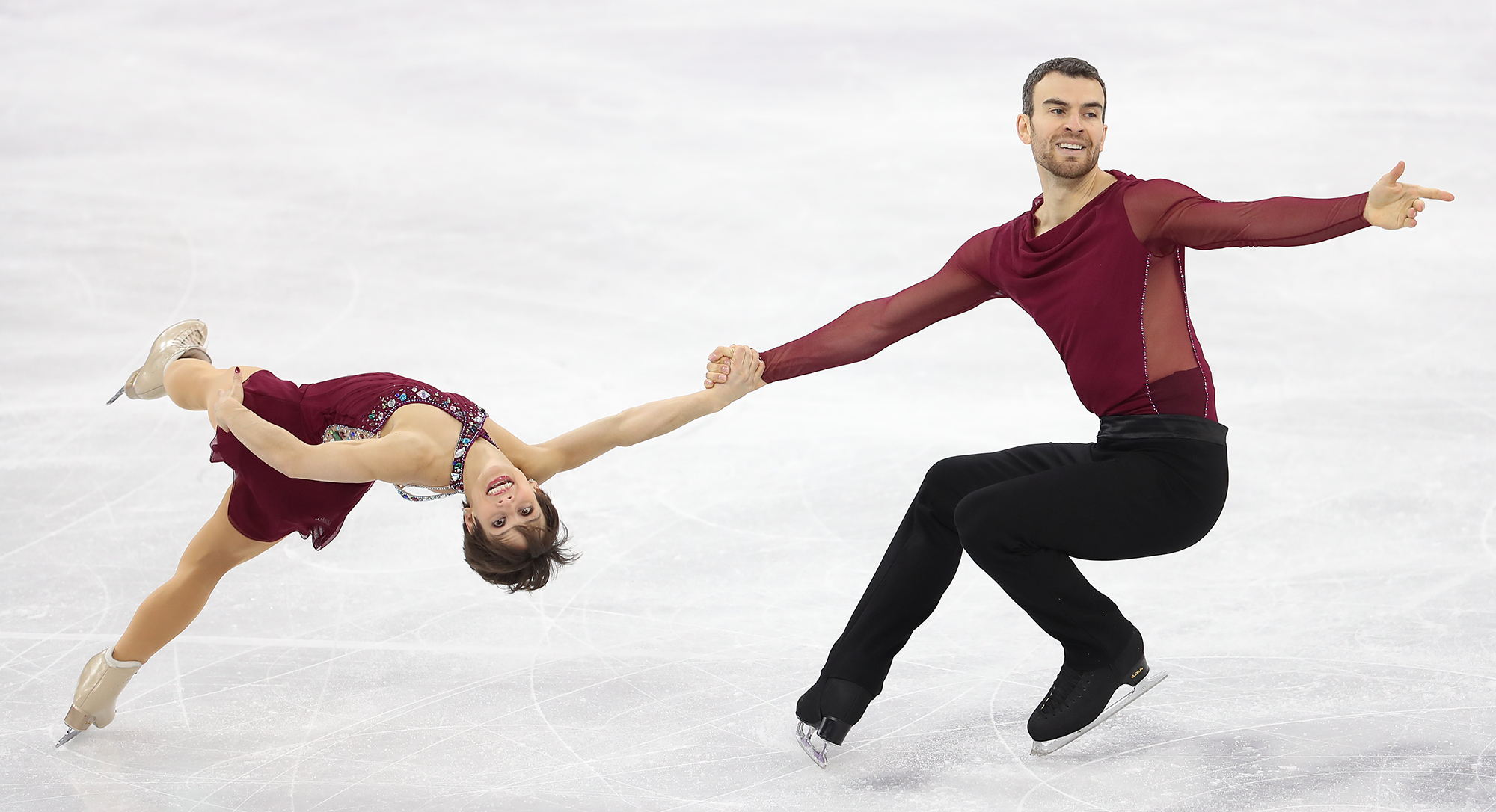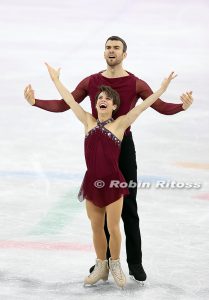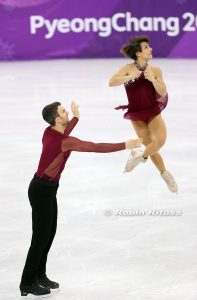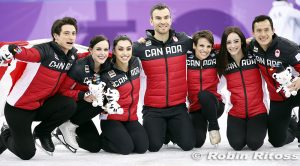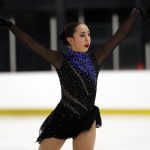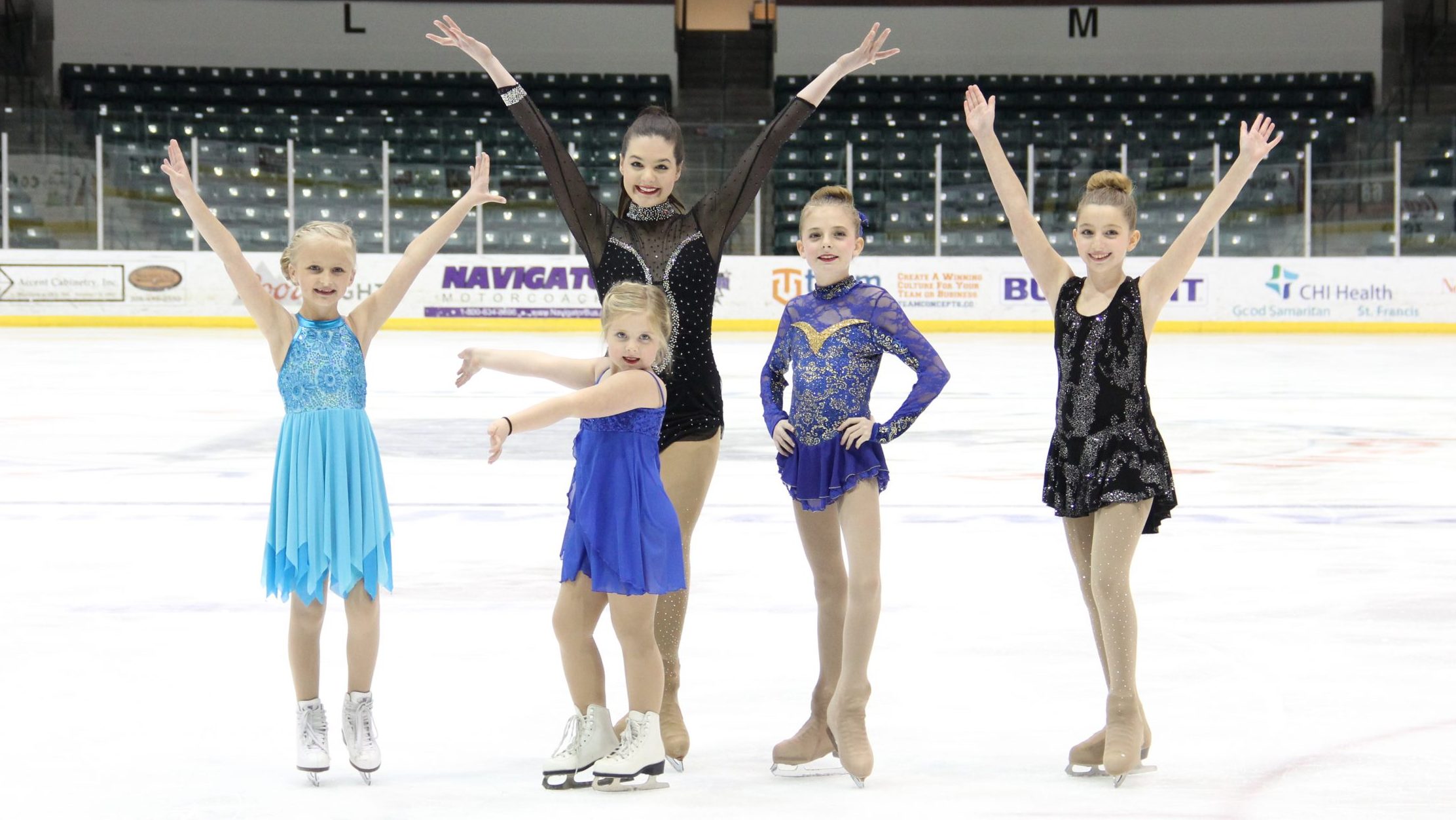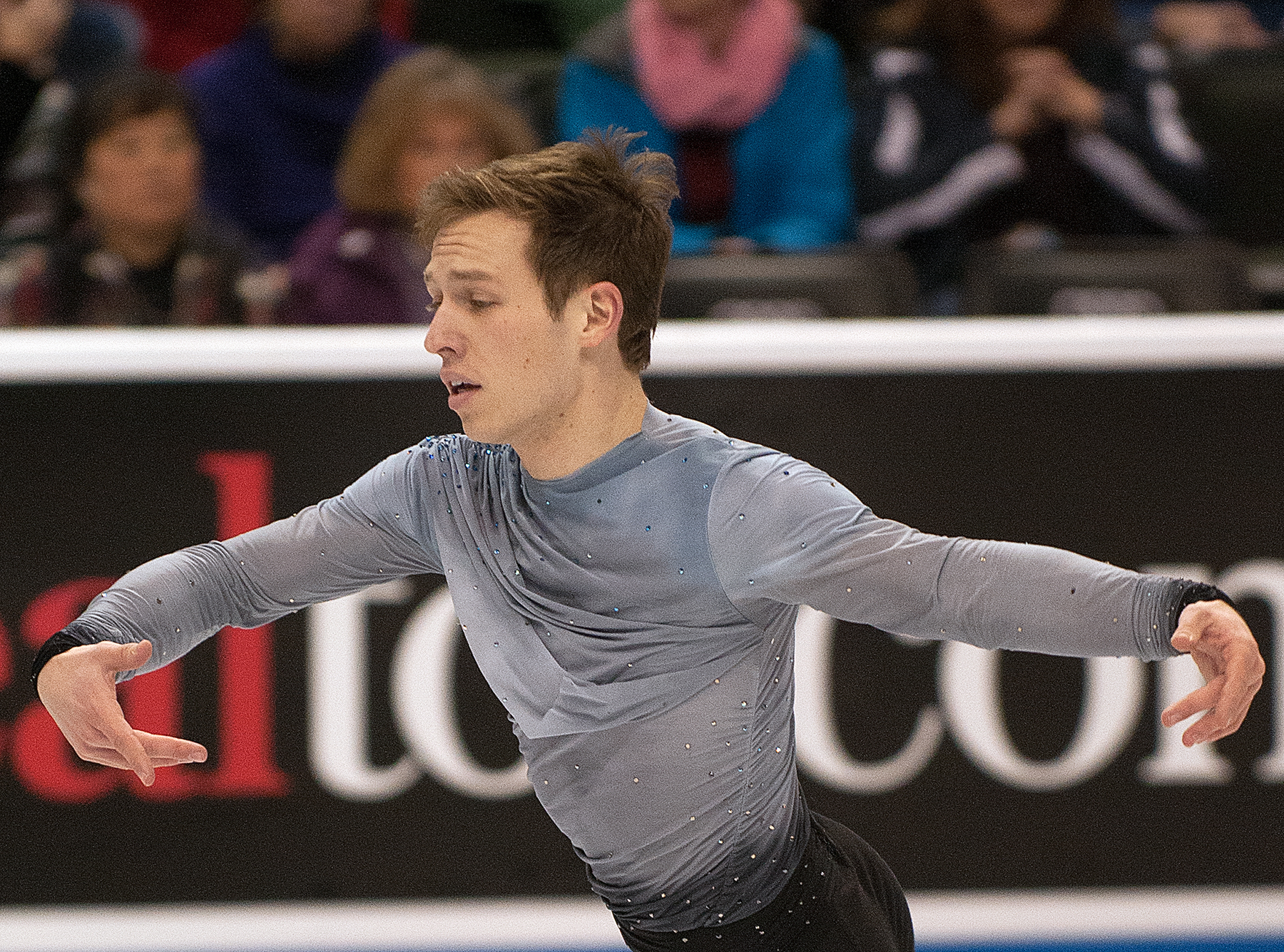By Francesca S., Figure Skating Evolution (@fs_evolution)
Header photo by Robin Ritoss
An Olympic gold, silver and bronze medal, two World Championship titles and seven Canadian National titles. Those are just some of the extraordinary athletic achievements of Meagan Duhamel and Eric Radford. On April 25, the pair, who have competed together since 2010, announced that they would hang up their competitive skates and seek out new ventures in and out of the sport.
Francesca, of Figure Skating Evolution (@fs_evolution), a contributor to Figure Skaters Online, caught up with Meagan and Eric on July 2 in Montreal.
Figure Skaters Online (FSO): Congratulations on the ending of a fantastic career, culminating at the 2018 Olympics with a bronze medal in the individual event and a gold medal in the team event. Looking back, what are your favorite memories from your competitive career? What are you most proud of?
Meagan: One of my favorite memories is when we won our first national title in 2012. Nationals in Canada is a really big competition, I would put it on par with the World Championships, and winning it for the first time was like an ‘aha’ moment for us. It was the breakthrough that led us to our big results at the international level and it was the first time we had one of our great skates under pressure. It made us realize we could really do it and challenge for titles and changed the game of our career.
Eric: Another obvious one is Boston Worlds 2016 [their second World title]. It was exciting winning our first world title, but heading into that competition everyone was expecting it to happen, whereas in 2016 it was unexpected. To have one of our cleanest and best skates of our career in that moment, in that crowd, under those circumstances, was just one of those magical moments that every athletes dreams of having.
FSO: How different are your feelings about the two medals in PyeongChang? How did it feel to share team gold with the other team Canada veterans and friends of many years vs. earn your individual medal in such a close competition?
Meagan: Our plans were to be on the podium twice. We knew realistically that in the individual event our chance was likely to be the bronze medal, given the status that the German and the Chinese team had going into the Olympics. The bronze medal in the individual event has more depth to it as it’s our medal and represents everything we went through ourselves on our personal journey together. It feels like gold to me and it’s the one I hold the closest and cherish, but the experience of being part of team Canada and winning that gold medal, as well as the silver medal in Sochi, is unique and different. It may not be the medal I dreamt of winning as a child, but the team aspect was really special, shared with the people we grew up skating with. Most of them were on the team when we took silver in Sochi, so to take that and turn it into gold was really cool.
FSO: What were your favorite programs to perform?
Eric: One of my favorite programs was “Concierto de Aranjuez”, the short program in our second season together (2011-2012). When I go back and I watch it, it was really intricate and complex, we executed it really well a lot of times, it had a great style, feeling and character.
Meagan: I think we were underscored in it because we weren’t a top team at the time, and I feel like if we had the same program as a top team the scores would have been different. For me, also La Bohème, the short program at 2013 Worlds, is special. It was a high-energy, dynamic program that we skated cleanly almost the entire season. It was the program that pushed us onto the next level, to win medals at the World championships. And it was a program that really stood out in the field back then, as no one was doing that upbeat style for the short program. That year a new rule came out that there would be a bonus for putting elements after the halfway point, so when we choreographed it we put the side-by-side triple Lutz at the halfway point. Then it was clarified that only singles would get the bonus. We had already choreographed the program and it worked with the music, so we kept it like that. We didn’t need to do it, but felt like we could, looking back was kind of a silly risk to take, but we did it the whole season and it worked. Unfortunately we didn’t get any reward… the same for the other short program Eric was talking about, where we ended with a throw. Those programs were interesting; back then, we were trying to make them as difficult as possible because that’s how we thought we were going to get a good transition and choreography mark, so we packed our programs to the point where they lacked flow because they were too difficult for us to do. Eventually we simplified our programs and the scores went higher, isn’t that odd…
FSO: What were your favorite elements?
Eric: When we started hitting the side-by-side triple Lutz, it was something new and exciting for everybody including us. At practice, there was always a cool energy knowing that we were doing something that other people weren’t.
Meagan: …and then it got sad when people got used to it and nobody at our rink clapped anymore, and I thought: ‘Eric must have doubled…’, so we had to find new things to be excited about. We also had our side-by-side spins well choreographed into our programs, so they would come at a change of music, always at center ice. We had good side-by-side spins and tried to highlight that, we always got a big response from the crowd, on a unique element to have a response for, and I always got excited.
FSO: What are you best off-ice memories together? Any stories or adventures to share?
Eric: Meagan and I went to vacation in Bermuda once when we started skating together, which was really fun. We scootered around the island. We also played a lot of uker, a Canadian card game, but it’s funny because when Meagan and I are on the same team we never win.
Meagan: We’ve traveled a lot. We’ve often incorporated touristy stuff into traveling for skating. One year, we went to a Grand Prix in France and we went there a whole week early. We went to Disneyland Paris. We also went once with Bruno (Marcotte) to Tokyo Disney World when we were in Japan. We always found time when we were at an event for skating, to make it a fun trip and unique experience.
FSO: Now something about your partner: what’s…
- Your favorite thing about each other?
Meagan: Eric is very stable and consistent. His energy doesn’t fluctuate up and down, he’s easy to adapt to and to work with. He was very consistent with the skating because everything was so leveled, mentally and physically. But he’s like that as a person and it translates over to skating.
Eric: Meagan’s motivation and perseverance always kept me going in moments when I wasn’t so motivated myself.
- Something people may not know about you?
Meagan: Eric’s a big video gamer. People only know him for being a musician, but he’s really into video games.
Eric: The one I usually say, but now everybody already knows it, is that Meagan doesn’t like being in tall buildings, or flying, which is kind of counter-intuitive considering she spends so much time being high up in the air.
FSO: What will you miss about competitive skating? What will you not miss?
Meagan: There’s an adrenaline rush in that moment when you’re on the ice waiting for your name to be called and the music to start. It’s a combination of an absolute fear and terror and anxiety with an excitement and confidence, a mix of the worst and the best feeling at the same time. It’s like being on a roller coaster. That’s a feeling I’m going to miss when it’s coupled with a great skate. I don’t think there’s something I’ll do in my life that can replicate that. I lived that for a long time and I’m happy to have experienced it and let it go, but I’m sure I’ll miss it at times.
Eric: That sense of satisfaction and relief in your ending position when you’ve done a really good job, whether it’s coupled with the amazing reaction of the audience or not, you just feel so proud and happy. Like Meagan said, I don’t think there will be something I’ll go through that will bring that same sort of incredible feeling. But before that moment, I will not miss when you’re backstage waiting. At the Olympics, when were waiting to do the long program, I took a second to look around and ask myself :”will I miss this?” And I was like, “nope!” I have no desire to go through it again.
Meagan: Another thing I’ll miss will be the daily grind. I’ve realized through talking to people that I’m one of the few athletes who actually enjoys the daily grind. I loved going to the rink and loved a bad day as much as a good day, I loved to go to the gym, to do a long program, challenges like that and working towards something. I’ll have to find new things to work towards, maybe training for marathons…
FSO: After this competitive season you went on the Japan and Canada Stars on Ice tours, where the crowd reactions have been incredible. Tell us about your favorite moments and your feelings during the tour.
Eric: When we were in Halifax, everybody was backstage and we were getting ready to do the first show. The opening video played and we heard the audience for the first time. It was the loudest cheer anybody had heard at a Stars on Ice show. We were just looking at each other and nobody was speaking because we were feeling that energy. In that moment, we all huddled together and looked at each other and said “I’ve got your back” to everybody else, and it became our ritual before each show. I loved that moment and how it continued through the rest of the tour.
Meagan: For both Canada and Japan Stars on Ice, we had two show numbers. One of our programs that we really liked was to “Sign of the Times” by Harry Styles. It was an emotional style of skating that we enjoy. Then we had a more upbeat program, “Be Mine”, filled with tricks to keep it exciting and dynamic and non-stop, but it was outside our comfort zone. We created new things like turning a lift into a headbanger without putting me down, and all sorts of cool stuff. At every show, the crowd would go wild for it and we would laugh in our ending position because we didn’t really feel an emotional connection to it in the way that we did with the other program. We kind of put it together one night at 10:00 p.m. with Jeff Buttle in Toronto, but it turned into something so great for the audience.
FSO: What are you are looking forward to in the new “Thank You Canada” tour this fall?
Meagan: That’s going to be a really long one, two months in a bus! Canada is a big country to get across.
Eric: I’m excited to get to skate with all our friends again, with most of the gold medal-winning team. From an artistic perspective I’m excited to see what we can put together. We are trying to have a show different than Stars on Ice in an unique way that hasn’t been done so much in the skating world.
FSO: What do you think of the changes in the scoring system, specifically for pairs?
Meagan: It’s going to be interesting for the skaters, but also for the judges to gauge what’s a +3 now, what’s a +5. For pairs, a lot of the rule changes came with lifts and I hope we’re going to see not too many missed lifts, but lifts with a lot going on, more than we’ve seen in the past. I’m really intrigued to see how the judges are going to react. I’m not quite sure what’s going to be considered a +5. In my head, it is the twist of Aljona (Savchenko) and Bruno (Massot) or (Evgenia) Tarasova and (Vladimir) Morozov. But what’s a +5 spin? I don’t know how to gauge these things and I think we’ll find out as the season goes on. It will be fun, I’m excited, but I’m happy I’m not in it. That would have been so much work changing every lift… I will leave it to the younger skaters.
FSO: What do you see in the future of Canadian pairs for this next quadrennial?
Eric: At this moment I don’t really know. I have an idea of the teams that will be competing like Michael [Marinaro] and Kirsten [Moore-Towers], Julianne [Séguin] and Charlie [Bilodeau], Trennt [Michaud] and Evelyn [Walsh]. It’s nice to see that there’s depth and each team has their own strengths and things they need to improve on. It makes it very interesting because it will be whoever decides to take that opportunity to establish themselves. A lot will be revealed in the summer competitions and then into the fall, we’ll see somebody emerge from the pack.
Meagan: We don’t have many teams, but all the senior teams we have are good and capable to compete at the world level. It will be interesting to see how it plays out, right know the two teams at the top are Kirsten and Mike and Julianne and Charlie, and regardless of who ends of on top, I think they are going to push each other over the next few years to fight for top five or top three at worlds. You need that at home like we had Kirsten and Dylan [Moscovitch] with us.
FSO: Who do you think will be the top international competitors? Give us your opinions on the current pairs field.
Eric: When I looked at the list for the Grand Prix, I noticed there are so many new young Russian teams, I’ve seen a couple of videos and it looks like there’s a lot of potential like always in Russia. Of course, [Wenjing] Sui and [Cong] Han are there so they should be always close to the top. After our first Olympics, it’s when we recreated and found ourselves, and started the change in pairs skating. So I think it will be interesting to see what the experienced teams will do in this new cycle to stay original, and then for the younger ones, what’s going to be their secret weapon to establish themselves.
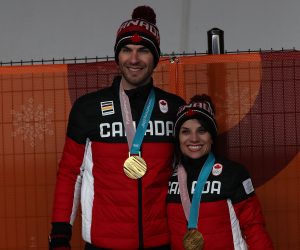
Meagan: This is the year for somebody to seize an opportunity. Four years ago, Eric and I saw an opportunity and we seized it, and that took us off for the next 4 years to become one of the best teams in the world. I’m looking forward to see who’s going to do that this year, who is going to step up and separate themselves from the pack. It may not be with a throw quad the way that we did, but it’s going to be interesting to see who we may not be expecting. May be one of the young Russian teams, or a North American team… the door is open.
FSO: Eric, you were the first openly gay gold medalist at the Winter Olympics. Canada house was also Pride House in PyeongChang. Tell us more about this experience and your current involvement in several campaigns.
Eric: At PyeongChang, I got a sense of a shift in perception and evolution of the LGBT movement at an event like the Olympics. There was a big contrast between the climate in Sochi compared to PyeongChang. I didn’t really think about the whole aspect until after the competition, heading in I was just focusing on my job to do, and only afterward learned that I was the first openly gay gold medalist. All of a sudden I had this launching pad to tell my story and try to make a big difference, and I just feel lucky that it all happened. Coming back to Canada, I’ve been involved in some events at the Toronto Pride, I had a Pride in my hometown and I spoke at some schools. For me, it’s all about sharing what happened to me, what I experienced as a kid and how it all ties into my career in skating, feeling comfortable to come out. I just get to tell my story and through that I hope I get to make a difference for young LGBT athletes and people in general.
FSO: Eric, you have mentioned you would like to spend more time composing and playing music now. Can you tell us more about your plans, and are you planning to compose skating music too?
Eric: I have a feeling that any music I will compose will always be skating music, I just think in that way, how would I be able to skate to what I’m composing. I’ll be excited to really start having more time to spend on my music. I’d like to go back to school either to finish my music degree or something more specialized like composition, or a specific music composition program or producing program. I have hardly been home since the Olympics. It’s something I’ll do when my schedule settles down. I do want to make my own album, which a skater could come along and use if they ever wanted to. I also have received specific requests for an event within skating, but you’ll hear more about that later.
FSO: Eric, you are engaged to Spanish ice dancer Luis Fenero. Can you tell us about your wedding plans?
Eric: Right now, our plan is to get as stressed as possible because people keep on asking us and we don’t know anything yet. We know it will be in Spain. I keep on telling everybody that I think between Canadians and Spanish, the Spanish know how to throw a better party. I’m leaving for Spain tomorrow and I’m going to be there for a month with a small goal of finding the venue and setting a date by the time we come back.
FSO: Meagan, you are studying holistic nutrition and you plan to start a wellness program for skaters. How are these projects coming along?
Meagan: I’m now on my final unit. It’s vegetarian nutrition so I should go through it very quickly. I hope to be finished by August and then I’m going to start compiling everything to create a program. A lot of people asked me already for help and I’m trying to give them information, but I don’t have time right now to create a nutrition program. I need to finish my studies before I can dedicate my time to help everybody. I’m also looking forward to doing some training so I can teach essentrics or yoga or strength training, so I can incorporate proper warm up, cool down, and training plans along with nutrition and wellness.
FSO: Meagan, you are getting into coaching and you would like to become a technical specialist. More specifically who are you going to coach and what will your role be?
Meagan: I’m doing my technical specialist training in three weeks. It’s the singles training as there was none in Canada this summer for pairs. I’m going to start from there and I’m really excited. I have a few projects with coaching, it’s really fun. I’m helping Julianne and Charlie along with their coach, to give my insight and perspective. They come to me once a week and I go to them when they ask me. I also help Bruno [Marcotte] and Ian [Moram], who are coaching the pair teams in Saint-Julie, and I’m teaching off-ice classes in Saint-Julie and coaching whenever they need me. Bruno and I also started to work with a hockey team teaching them edges and skills, it’s really fun. I realized today I’m a better skater when I don’t try to have a nice posture. I’ve got really good edges and really good power when I’m skating like a hockey player. Next week, I’ll switch to hockey skates and I’m going to practice with them. The kids are having fun learning from me.
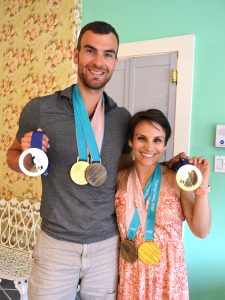
FSO: Do you have any joint skating projects?
Meagan: Something else that we are doing is seminars. We were in Australia in March, in Ottawa this weekend and we are going to Mexico in August. I’m also going to Iceland in August for another seminar. It’s fun to teach and to give back. Kids usually really enjoy it. More than technically, we want to inspire them to reach their potential. We hope to do more in the future, too!
FSO: How do the kids react to having their idols teach them?
Meagan: Depends how old they are, the older ones tend to be standoffish at the beginning and then they warm up to us.
Eric: What I find funny is that sometimes the parents would come up to us and tell us ‘oh they’ve been so excited, they’ve been talking about this for a week’ and then when we meet the kids, they just stand there and look at you and don’t say anything.
Meagan: I think they get nervous. They have long days so usually by the end they start to warm up to it.
FSO: You announced an upcoming book Soulmates on Ice. Can you tell us more about it?
Meagan: It’s going to be released this fall, but it’s already available for pre-order on Amazon. It’s being written by Laura E. Young, a writer from Northern Ontario, where we are both from. She’s done reporting and writing in the local newspapers since I was really young. It’s just our story, an honest outlook on our journey, trying to be as authentic as possible. We are not sugarcoating anything. We’ve had our career being outspoken and honest.
Eric: I think you get to jump inside our heads to see everything we went through from our perspective, have an insight into what it really took to achieve everything that we did.
Meagan: The writer is writing it from our perspective, we told her our stories, and our parents and coaches did too. She starts writing from her point of view and then she goes into our story, throughout our career. I think it’s going to be good, I sent it to one of my friends in the skating world. He thought it was one of the most compelling skating stories he has read, because he thought it was so raw and authentic.
FSO: Which lessons are you going to take from your competitive career and apply to your daily life?
Eric: It’s going to be important for us to have new goals for ourselves to work towards to, whether it’s me with my music or other projects with the LGBT community. I think sitting at home would drive us nuts. What I notice is that when you have a new goal, like now that I’m trying to learn Spanish slowly. I’ve been told I have to learn it before the wedding. You have to keep your head low and put one foot in front of the other towards the goal. You know you’ll hit a wall and you’ll feel like you may not be improving, but we know from our everyday training that you just keep going and you’ll get to where you want to go.
Meagan: I learned though my time in skating to really enjoy the journey. At the end of the day, there is no clear destination. I don’t see the Olympic podium as the clear destination, it’s where we ended up, but here was a journey that took us there. I feel like as we go through life now, I’ll enjoy the journey, whether it’s when I’m asked to speak at events or coaching, studying…
Fan questions:
Fan: I’ve always been fascinated by your rivalry with [Ksenia] Stolbova and [Fedor] Klimov in 2014 and 2015. Can you share some insight into the nature of that rivalry?
Meagan: It feels short-lived because it was only really one season.
Eric: When I look back at that time, it reminds me of the movie, The Cutting Edge, with the North Americans versus the Russians, or Canada versus Russia with Jamie [Sale] and David [Pelletier] vs. Elena [Berezhnaia] and Anton [Sikharulidze]. Ksenia and Fedor are incredible athletes and they were amazing competitors. They were so consistent, which is why I think they really exploded onto the scene that 2013-2014 Olympic season. It was a really intense energy between us. I remember being at the Grand Prix Final in 2014 and they didn’t miss anything at practice and we didn’t either. Then they skated clean and we skated clean. On the ice, it was exciting for us and all of the fans. Off the ice, I think people could see that Ksenia could come across as cold, which was really funny because in the last couple of seasons she really changed. Ksenia would go up to Meagan and ask how everything was going. We would play with her dog at competitions. It was so funny to see how the perception of her changed from those first seasons.
Megan: I think people in skating saw it too. She started to smile and laugh. I remember they had a terrible short at Worlds and they laughed about it. You would never had seen that two years prior.
Eric: And Fedor was always a nice guy, very easy going, an amazing competitor. He never missed that triple toe-triple toe combination. It was really impressive.
Follow up to fan question: Related to that, can you talk about your other main competitors during the past quad, their strengths?
Meagan: We competed against [Weijing] Sui and [Cong] Han since the very beginning of our career. Even in 2011, they finished 2nd at Skate Canada and we finished 3rd. When they had that cowboy short program, he would do his death spiral and pretend he was swinging the rope over his head. They were always such good competitors and nice people. We enjoyed competing against them even though they beat us most of the time. They actually were one of the reasons why we wanted to do a throw quad in the first place. When they were doing the quad twist, they told us they were practicing a quad flip and we were like, ‘We have to learn these things, or these kids are going to keep beating us!’ They were always really supportive and really nice to us about our skating, I remember many times he asked us, ‘How did you skate? I missed it. We are going to watch you guys online.’ They are such nice people, and as happy as I was for Aljona [Savchenko] and Bruno [Massot] at the Olympics, I felt really bad for the Chinese. Seeing them so disheartened made me really sad that they didn’t enjoy that moment.
Eric: Season through season, you always see momentum building behind some skaters, and when we saw Sui and Han at the first competition into 2016-2017 and they came out and had improved their style and their stroking. I think everybody noticed that there was something different and mature about them, she was really selling it, they reinvented themselves with interesting programs. Whenever I see a competitor able to do that, I have so much respect as it’s so impressive to try to stay original and find something fresh, but at the same time take a step forward and add complexity, that’s the most difficult thing to do. When you’re at the top and the technical stuff is there, it’s the little things that become the most important. When you would see these teams like Aljona and Bruno, they made huge strides season by season, the French team when they came out a couple of seasons ago, the Italians at the Olympics this year, I felt so proud of all of them, it made me really happy to see that.
Follow up to fan question: How do you manage to both be a fan of skating and focus on your own skating?
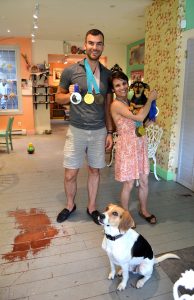
Meagan: When you’re on the ice, you’re thinking of yourself, but when I’m at home and I’m watching the senior B’s or videos coming up from the summer, I’m intrigued. As a skating fan, I can’t wait to see what [Evgenia] Tarasova and [Vladimir] Morozov come up with this year for the long program. I hope it’s something great. I’m interesting to see what people are going to do. I was like that all these years. But it’s a fine line to watch the others off the ice and to focus on yourself on the ice. An important thing was that on the ice we weren’t thinking of what people were doing.
Fan: What was the last piece of advice your coach gave you guys at the Olympics?
[Editor’s Note: Bruno Marcotte, the coach of Meagan and Eric, was present during the interview so the question was asked directly to Bruno.]
Bruno: I remember we had a talk with Eric the morning of the short, just to let them know that whatever was going to happen on that day, it was not going to define who they are. It was just going to define what they did on that day, so not to overthink. They had already accomplished two clean programs and winning the team gold medal. I remember we had this really good talk. All they did between Nationals and the Olympics were clean programs at home or sometimes with a tiny mistake. It was really about trusting their training and remembering the way they trained. Trust your training, trust your partner, and keep the focus on the two of you. I told Eric that what defined him was more the way he came back from the injury of the previous season, and how he approached his training this last season.
Fan: What’s the key for a good partnership? How do the skaters know the partnership is adequate to their needs?
Meagan: The key to a good partnership is to be adaptable. We’ve seen so many really great teams that never succeeded because they were too stubborn and never could adapt to one another and open their minds. Along with clear communication and understanding that you are working towards the same goal regardless of what happens on that day or on the ice at competition. No one is going on the ice to try to make mistakes; you’re always working towards the same goal and the best you can be.
Eric: The partnership is like a relationship. The key is good communication and, like Meagan says, staying adaptable. Something that I find remarkable is how on the same page Meagan and I were right from the beginning. There was never a day when we weren’t trying to be our best or improve something. I also think we were really good when we weren’t with a coach to try to figure things out on our own, and able to communicate that in a healthy way. We never accused one another of not doing something. It was more like ‘I’m going to try this’.
Meagan: We were left alone to train a lot. We spent almost our entire career in a really busy training environment. The coaches had to give attention to so many people. We had a coach a lot more often for this Olympic year, but the years before, we would have our lesson and then work on what the coach told us on our own. When we were learning the throw quad, I would say ‘I’m going to try this’ and Eric would say ‘Okay, then I’m going to do this.’ Same thing with the death spiral. ‘I’m going to open up my shoulder more’, and he would try to hold it longer, etc. It was always a clear communication of what each of us was trying to do instead of blaming the other.
Eric: We had a clear target every time we did an element. It was never ‘Okay let’s do another one.’ It was always like ‘We are going to do another one and this is what we are doing…’ for every single element.
Meagan: We were doing an off-ice lift class last week and I was trying to teach that to the kids. I would ask ‘what are you doing on this lift, what are you trying to do, what’s your goal?’ You tell each other that, so that you work on yourself instead of ‘I want my partner to do this’. If you both have the goal to make the lift better, you’re going to go from here and meet at the highest point.
Fan: If you could turn any activity into an Olympic sport, what would you have a good chance at winning another medal for?
Meagan: Being productive really early in the morning. Sometimes it’s not even 8 a,m. and I’ve gotten so much done. I can wake up early and do a lot really fast.
Eric: When I lived in Toronto, all of the skaters at the Cricket club played on a dodgeball team, and I used to joke that if dodgeball was an Olympic sport, I would quit skating because I loved it so much. It was really fun and it had that team atmosphere and team bond. Each person on the team can have their strengths and their weaknesses, and we were so competitive. I could see myself as a professional dodgeball player. Meagan and I actually played on a team here on our second year together.
Megan: But a lot of people were getting hit in the face, getting concussions and black eyes, an important year was coming for us and I was imagining ourselves showing up at Skate Canada with a black eye…
Fan: I’m curious about the decision to retire. Were you both always on the same page as far as your timeline or did one have to bring the other one around?
Meagan: We were always on the same page. We finished skating our long program at the Olympics and someone at the press conference asked if we were going to Worlds and we hadn’t said anything to each other and just both answered “no” instantly. We knew our goal was to skate well at the Olympics. The hardest thing was after 2016 Worlds in Boston. I was really seriously thinking that we should be retiring as it’s never going to get as good as that moment, that season. We went on tour and we were really successful, and I remember coming back and telling Bruno I didn’t think we should continue, there was nowhere to go. In those times he just reminded me ”who cares, if your results suffer are you going to be less happy or still enjoy the process and the competition?” I was still going to enjoy the daily grind, there was nothing else I wanted to do. I’m happy it wasn’t the end. I didn’t think it would get better than Boston, but it did.
Fan: Have you chosen your programs for the “Thank You Canada Tour?
Meagan: I’m not sure how it’s going to work, what type of programs they want us to do. But I think the people can look forward to the possibility of us to bring something back.
Fan: Do you think your “Alice [in Wonderland]” program would work now that vocals are allowed?
Meagan: A few people have asked me that, I’m surprised they even remember that as I find it kind of forgettable. It was Richard’s favorite program we ever did. It’s really funny because I’m not sure it would have been better with lyrics, because we never skated it cleanly. When we were choreographing that program we thought that we were coming up with something so unique and so amazing and we would blow people’s minds. We were trying to be different and more character driven, which was something we never tried before and we didn’t try again after because we realized we weren’t good at it. But when we were choreographing it we had this vision that it would be something so unique and successful and it just never translated. We never felt comfortable and settled into the program, it got close but never like we could exhale, we were always holding our breath. It was difficult, we had this move out of the side-by-side triple Lutz where Eric glided in a spread eagle and I jumped through his arms and he flipped me over, it was such a silly move but it was so difficult because Eric was moving and I had almost to stop to go through this hole that he created, our tracking had to be perfect. We had a lot of tricky stuff that never got seamless so the program fizzled out from how great we thought it could be. And then that season I could never land a triple Salchow, so even when we skated well there was always a mistake. It’s funny how these things work. For example when we were choreographing our “Hometown Glory” [free skate] it felt just like another program, but then turned into something so great.
Fan: Do you ever think of going to India and studying and expanding your knowledge of the eastern life style (yoga, diet, meditation etc)?
Meagan : I’m planning to do that. I need a couple of months to dedicate myself to it. Go to India and live in an ashram; that’s on my bucket list.
Fan: What fascinates you?
Eric: This is something people may not know about me, but something that fascinates me is cosmology, I read a lot of science articles about quantum theory and what they are doing at the CERN collider, searching for new particles, I love all that type of cutting-edge science. I like to follow the updates on new discoveries. I’m reading a fascinating book right now called Sapiens: A Brief History of Humankind by Yuval Noah Harari. It’s all about human evolution, anthropology, how we got to where we are. But it’s kind of hard to bring up in conversations, people don’t really feel like talking about evolutionary biology…
Fan: If you had to go through every single step of your career together a second time, would you do it again?
Eric: YES!
Meagan: It’s interesting because you remember the great skates, winning medals, but I find that at the end of the day there’s a beautiful experience in the terrible ones too, because they are what develop you in the person and the athlete you become. There’s something beautiful that lies in the lesson, in a difficult pill to swallow. It’s something that I take away from all of those not-so-great programs.
Fan: What’s something you wish you knew before getting into competitive figure skating?
Eric: Bad skates are going to happen. There is no need to fear them, and it’s where you’re going to learn the most from.
Meagan: You need ten bad skates to have a great one, and that’s what makes the good ones so special and memorable because you know what the lowest low feels like, so you can really feel the highest high.
Fan: What is something that your skating partner would consider so “you”?
Meagan: [points at the vegan burger and salad on her plate] This salad?
Eric: Kale, veganism, health.
Fan: Are you going to be at the Grand Prix Final in Vancouver?
Meagan: This is something I started working on this week. We would like to be there to sell and do signings of our book. We hope that the ISU and Skate Canada are going to help us out, and at the Canadian Championships, too.


